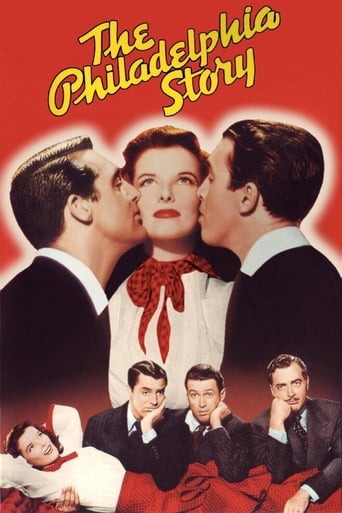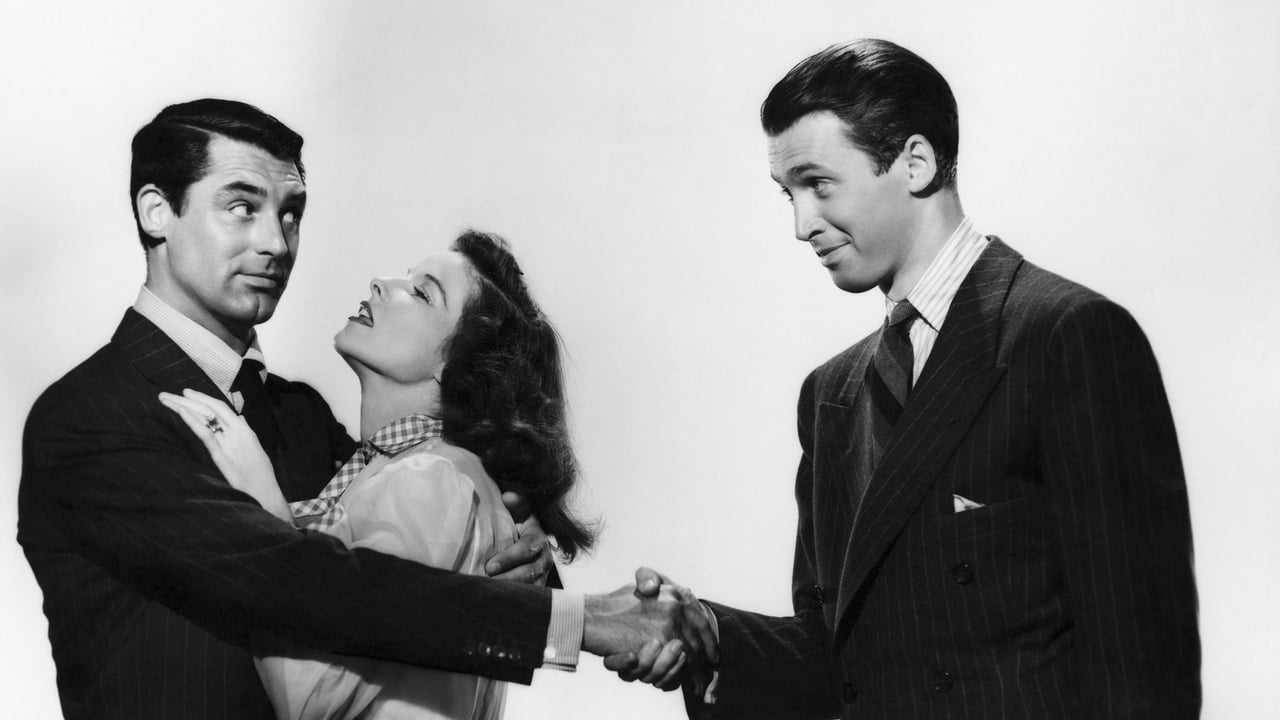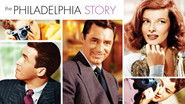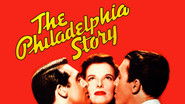daoldiges
Grant and Hepburn were married, then divorced, but secretly both still harbor feelings and want to get together. Of course neither of them realizes this until it's almost too late, as Hepburn has become engaged to someone else. Grant is the instigator in the reunion efforts. This is a story I've noticed that is quite common in many of the films of Cary Grant, His Girl Friday, with Rosalind Russell standing in for Hepburn, comes immediately to mind, but there are others as well. Still, this is an enjoyable film and Hepburn and Grant along with Jimmy Stewart all come together to make this film worth watching.
pyrocitor
Recently, when my mother was having a tough time, she creaked open her cupboard, and pulled out a well-loved DVD. "Let's watch The Philadelphia Story. It'll be nice to disappear into the delightful struggles of the rich and beautiful for a while." And, though it's an indisputably lovely watch for audiences old and new alike, whether watching for the first or thirty-first time, it's more than rote comforting, Classical Hollywood escapism that makes The Philadelphia Story truly special. It's seldom that we find a film with such modestly entertaining aspirations assembled with such consummate care, as director George Cukor's feather-light direction and perfect pacing allow the film to bubble like champagne, but sink in like a sumptuous feast - indisputably one of the most impeccably loveable and utterly unmissable films of its era. Naturally, it helps to boast one of the most airtight, razor-sharp romantic comedy scripts of all time. Writer Philip Barry (adapting Donald Ogden Stewart's stage show) has as much fun peppering the film with the deliciously salty repartee as he does having his characters playfully massage every syllable out of the most riotously intricate names - from the mouth of Jimmy Stewart, the seven syllables of 'C.K. Dexter Haven' somehow emerge as a contemptuous political haiku. Cukor and his players have a ball poking fun at the ludicrous posturing of old money snobs, but the film's class divide is treated far more tongue-in-cheek and with tender sympathy than the savage, cartoonish satire of the average circa 1940 screwball. The film's plot might suggest the gossamer silliness of a Society Magazine take on Much Ado About Nothing, but underneath the Russian Doll subplots of mischievous double-bluffs of masquerade and library and poolside meet-cutes (all delectably zany in their own right) lies a surprisingly rich, compelling, and fundamentally human story, bursting with emotion and heart. Underneath the marquee of comedy of manners zingers lurks an underbelly of genuine family drama, as affecting as it is entertaining, postulating that a yearning for genuine connection - to be really known, beyond social status, trappings, presumptions, projections, and posturing - is, perhaps, the most universal of desires, and the message hits home with the effervescent pop of a bottle of champagne downed a little too fast. But, let's be honest: we're here for the legendary triple-act of Classical Hollywood heavyweights Hepburn, Stewart, and Grant. They do not disappoint, playing off each other with dazzling ease, and showcasing some of the most effortless banter and deep-set chemistry in cinema history. Hepburn has never been better than she is here - she imperiously commands the screen with a hailstorm of scathing punchlines, before embodying the self-esteem imbalance of a woman inundated with superficial praise, but seldom genuinely appreciated, to an unnervingly human degree. She's funny, sad, and almost unspeakably loveable, in an astoundingly heartfelt rollercoaster of a performance. Still, this is unquestionably the Jimmy Stewart show, as his sour, curmudgeonly indictments of the superfluity of wealth are as utterly hysterical, even moreso when giving way for a softer, poetic, recitations betray an aspiring artist beaten down by self-doubt and the financial impediments to wholeheartedly pursue his dream. A decidedly unconventionally subdued Grant rounds up the trio with the least showy performance, but his performance betrays staggering subtleties of inner emotion and past demons. Sneakily puppeteering his peers while firing off innocently acrid witticisms with his never-drier deadpan makes him an exquisitely sarcastic Greek chorus of sorts, and the mischievous twinkle in his eye is as entertaining as all the banter in the world. The rest of the ensemble are all magnificent in their own right, particularly Ruth Hussey as Stewart's perennially spurned, icily deadpan photographer companion, and twelve-year old Virginia Weidler, uproariously funny as the Lord family's gutsy daughter, belligerently unwilling to accept the stubbornness of her older family members causing mishap after mishap. There's the occasional bump in the road where the film shows its age - the calamitous, climactic partner-swapping follies flirt with being too silly to sit comfortably, and it's nicer to just pretend the eyebrow-raising prologue, which treats spousal abuse as a rollicking punchline, just never happens (thank goodness for DVD track-skipping). But, on the whole, this is the highest, most delightful caliber of movie magic imaginable. Whether you need to laugh or cry (usually both), find an airy diversion from life's tribulations, or discover genuine insight in the interplay of immaculately constructed characters, you'd be hard pressed to find a more deeply satisfying watch than The Philadelphia Story. To quote our dear C.K. Dexter Haven: "My, she was yar." -10/10
James Hitchcock
The Philadelphia Story" is one of the best-known examples of a "comedy of remarriage", a genre which dealt with a divorced or separated couple getting back together again. Such films are normally associated with America in the 1930s and 1940s, where they were popular because they allowed screenwriters to flirt with daring themes without breaching the requirements of the Production Code relating to the depiction of adultery. There were, in fact, occasional examples from other countries, such as the British-made "The Divorce of Lady X", and the format has sometimes cropped up in recent 2years. ("Sweet Home Alabama", "Did You Hear about the Morgans?) The couple here are Tracy Lord, daughter of a wealthy, aristocratic Philadelphia family, and her ex-husband C.K. Dexter Haven. Dexter turns up at Tracy's family home on the eve of her scheduled marriage to George Kittredge, a self-made businessman, and makes it clear that he would be interested in renewing their relationship, even though Tracy is less than pleased to see him. To add to Tracy's difficulties a third man has fallen in love with her- Macaulay "Mike" Connor, a journalist sent to cover her wedding.It quickly becomes clear whom Tracy will not marry. Poor George never stands a chance. Part of America's national mythology is "log cabin to White House", the idea that in America anyone can succeed if he has the "right stuff" and that there is therefore always something admirable about a self-made man. "The Philadelphia Story" subverts this myth with a vengeance. It is not that George is a vulgar parvenu- indeed, if he had a streak of healthy vulgarity about him he might cut a more attractive figure. He is stiff, pompous and physically unattractive; we never understand why Tracy ever got engaged to him, unless as a reaction to the handsome, charming and amiable (albeit flawed) Dexter, who comes from a similar social background to her own.As between Dexter and Mike the outcome is not so obvious. The normal rule in romantic comedies involving a love-triangle is "first name above the title gets the girl", but here both men are played by major stars, Cary Grant and James Stewart, who received equal billing. Intellectually, of course, we know how matters will end (or at least we do if we are familiar with the conventions of the "remarriage" genre), but emotionally we feel that Mike might just be in with a chance.The film was remade in 1956 as the musical "High Society". Now there was nothing wrong, in principle, with remaking it as a musical, but I have always regarded "The Philadelphia Story" as far superior to "High Society". The reason for this has nothing to do with the music- the songs are tuneful and the lyrics witty- and nothing to do with the story, which is much the same in both films. The reason for the difference lies in the acting in the main roles. I exempt from my criticism Frank Sinatra, who played Mike in the remake and wisely did not try to copy Stewart's interpretation of the role, realising that their styles of acting were completely different. Sinatra's Mike, therefore, is hard-bitten, cynical and wisecracking whereas Stewart's, an aspiring writer, is gentler and more idealistic. This film brought Stewart his only competitive acting Oscar, and a well-deserved one it was too.Between, Grant and Bing Crosby, however or between Katharine Hepburn and Grace Kelly, there is no comparison. Grant and Hepburn are both on top form here. Watching their battle-of-the-sexes duels you realise not only just why they found it so difficult to live together first time around but also just why both cannot live without the other. The main obstacle they need to overcome is Tracy's perfectionism. She sets high standards for himself and demands impossibly high standards of others, especially Dexter who complains that he was less Tracy's husband than "High Priest to a virgin goddess". Dexter, who is fond of a drink, has his faults, and doubtless tried Tracy's patience severely during their first marriage, but we realise that beneath it all he loves her deeply.Crosby, by contrast, is so laid-back that he is quite unable to make Dexter seem interesting; we never understand why Kelly's Tracy might have wanted to marry him in the first place. With Kelly we have the opposite problem; she is so heart-meltingly beautiful, and so soft and gentle in her manner, that we never understand why Dexter might ever have wanted to end their marriage. (In Hepburn's case her occasional flashes of temper make this quite obvious). It doesn't help that Kelly did not have a particularly good singing voice- unusually for the leading lady of a Hollywood musical, she only sings one song- or that Crosby was old enough to be Kelly's father, which lessens the chemistry between them. (The age difference between Grant and Hepburn was only three years).Two other good performances come from Ruth Hussey as Mike's attractive lady photographer Liz and the child star Virginia Weidler, who as Tracy's younger sister Dinah steals every scene she is in. Weidler had appeared in another film directed by George Cukor, "The Women", the previous year.Not all comedies of this period hold up well today. This was the third "comedy of remarriage" Grant made in 1940, the others being "My Favourite Wife" and "His Girl Friday". The first of these can today seem very dated, as well as overly sentimental. The second is a lot better, although much of its appeal lies in the way in which it combines its romantic plot with a good deal of satire aimed at the American press and political system. "The Philadelphia Story", however, is like a fine vintage wine, as good today as when it was first made. 9/10
Python Hyena
The Philadelphia Story (1940): Dir: George Cukor / Cast: Katherine Hepburn, Cary Grant, James Stewart, Ruth Hussey, John Howard: Hilarious romantic comedy about modern romance within the high class. Katherine Hepburn plays a high society woman who is engaged but her ex-husband appears thus making everyone uneasy. James Stewart plays a reporter whom Hepburn becomes smitten with. While very funny with a variety of personalities director George Cukor expertly presents elements of class and lifestyles. Cukor previously made a version of Romeo and Juliet as well as Camille and The Adventures of Tom Sawyer. This is one of his best films. Hepburn is wonderful as a woman seeking real romance and perhaps feels that her engagement to the strict and traditional John Howard isn't what she was seeking after all. She indulges in her free spirit guilt of romance thus placing her in the glaring eyes of sophistication. Cary Grant is hilarious as meddling ex-husband. James Stewart steals scenes as the reporter who spends a drunken evening with Hepburn. Ruth Hussey is superb as his photographer. John Howard plays the potential groom whose love life is about to unravel with two other suitors. It regards marriage and romance but also positioning one's economic status. One could easily observe that in the end, that is what makes news, isn't it? Score: 10 / 10



 AD
AD













